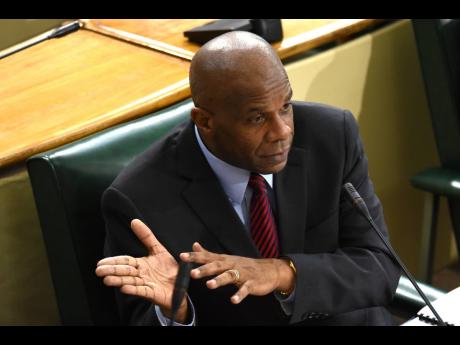Peter Espeut | Laughing and crying at the same time
It would be amusing – even hilarious – if it wasn’t so tragic.
The purpose and function of the Auditor General of Jamaica (AG) is to conduct audits of various kinds (e.g., financial, efficiency, environmental) of all the ministries, departments, and agencies of the Government of Jamaica (GoJ); which is why the AG is named to the Integrity Commission, which investigates possible corruption and malfeasance by public servants, including but especially politicians. The Integrity Commission – obviously – is an entity within the GoJ, and certain members of the Joint Select Committee of both houses of Parliament (all politicians) reviewing Jamaica’s integrity legislation are suggesting that it is a conflict of interest for the AG to be a member of the Integrity Commission since the AG might be expected to be called upon to perform an audit of the Integrity Commission, and that it is improper for the AG to be called upon to audit an entity of which she is a commissioner.
If the AG was asked to audit the Integrity Commission, that would indeed be a conflict of interest. It would be a profound conflict of interest if the AG was asked to audit her own office (of the Auditor General of Jamaica).
In the latter case, no conflict of interest is allowed to be created as independent auditors are contracted to audit the office of Auditor General of Jamaica. And clearly, the same strategy would be employed to avoid any conflict of interest surrounding the auditing of the Integrity Commission.
But now I ask you: is it not a profound conflict of interest for politicians to be reviewing Jamaica’s integrity legislation, the purpose of which is to detect and prosecute corruption by the very same politicians? The foxes are being asked to guard the henhouse! What a joke! Are you laughing? Or crying?
By the same token, is it not a profound conflict of interest for the salaries of politicians to be set by the same politicians themselves? I suppose we should rejoice that they did not award themselves increases of 500, 600 or even 1,000 per cent!
HEARTBREAKING
Isn’t it laughable – nay, tragic! And heartbreaking! – that politicians have “sensitive consciences” about the AG sitting on the Integrity Commission (potential conflict already resolved), but no conscience at all about openly discussing reducing the ability of the Integrity Commission to detect and prosecute corruption by the same politicians?
Allowing conflicts of interest to remain unresolved is a form of corruption. Having politicians themselves review anti-corruption legislation relating to their own conduct is a form of corruption. Would politicians recognise a conflict of interest if it hit them in the face? Do they really want to bring political corruption to an end? Or even to reduce it?
Jamaica’s integrity legislation – designed and enacted by the same people the Integrity Commission is supposed to scrutinise and police – is already weak and ineffective by design. Politicians are required annually to file declarations of income and assets, but there is no penalty if they fail to do so on time, or at all! Do you find that amusing?
These declarations are made in secret to a secret committee; any leak by the secret committee attracts extreme penalty; (death?) Why the double standard?
We Jamaicans mind other people’s business; local residents know who owns what assets in their area, especially politicians. Public asset declarations by politicians (required in advanced countries) allow the public to step forward and report omissions and inaccuracies. Secret declarations to a secret committee will never result in either the discovery of illicit enrichment or its prosecution. But that is the intention, is it not?
Raids on the henhouse
If the integrity legislation were reviewed by independent persons – or indeed by anti-corruption campaigners – the provisions would become stricter, and loopholes would be plugged. Already the perception is that the foxes are seeking to arrange for detection of raids on the henhouse to be made harder. The loopholes will be made larger. Attempting to meet in secret – excluding the press and the public from the deliberations of the Joint Select Committee – encourages this view.
I think we can expect the Integrity Commission to be weaker and defanged at the end of this review process. And we will have allowed it! The gag clause will not have been removed, declarations will still be in secret, the prosecutorial powers of the commission will be removed, and the capacity of the commission to gather evidence of malfeasance will be reduced. Nepotism and cronyism will still not be illegal. Breaches of procurement guidelines will still not be punishable at law. Contracts entered into with the private sector by the government will remain undisclosed, and political donations will still be undeclared, making it harder to detect bribery, graft and influence peddling. Is this “a joke business”, or does it call for weeping, wailing, and gnashing of teeth?
Is the Jamaican public going to sit back and allow these politicians to further make a mockery of the need for transparency and accountability? Why is the Constitutional Reform Commission meeting in secret? Is the Jamaican public going to sit back and allow these politicians to come to “consensus” all by themselves on the type of republican constitution Jamaica is to have? Is the Jamaican public going to sit back and allow these politicians to deepen Jamaica’s already extreme inequality by giving big bucks to those at the top and meagre increases to those at lower levels?
What is the mechanism by which the public can prevent politicians from arranging things to their own advantage? We can laugh, and we can cry. But that won’t change anything.
Peter Espeut is a sociologist and development scientist. Send feedback to columns@gleanerjm.com

